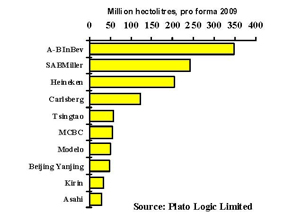This transaction brings Pernod Ricard closer to completing its EUR 1.0 billion disposal plan (approximately EUR 0.8 billion achieved to date).
If we did not have our archives at BRAUWELT International, we could run into trouble remembering which executives have run AB-InBev’s business unit Germany, Austria, Switzerland and Italy over the past few years. Because who can recall the name of Mr Hösel’s predecessor without resorting to Google? His name was Eric Lauwers (currently President of AB-InBev BeNeLux) who succeeded Oliver Tobias (now with Paulaner) in 2007.
In its report “Global Economic Prospects 2010”, which the World Bank released on 21 January 2010, the authors warn that while the worst of the financial crisis may be over, the global recovery is fragile.
After a decline in turnover during the first nine months of 2009, Krones managed to stem the tide of red ink during the fourth quarter when demand from China and Latin America began to pick up again.
“KKR is a strong partner with extensive global expertise and will assist Wild in its focused expansion and strengthening of our businesses going forward” said Dr Hans-Peter Wild. “In extending its reach, Wild will target foreign markets relying on KKR to support its financial positions and create new growth potential through its global network and acquisition.”
Apparently, unbeknownst to the likes of you and me, the big white elephant of the German brewing industry is hiding in deepest Brandenburg – that’s what modern-day Prussia is called. Pampered by taxpayer’s money and managed by a group of clever private equity investors from Berlin, the brewery has been churning out cheap beer for the German and Polish markets for years. In 2009 its 150 employees produced an estimated 2.1 million hl beer.
Heineken said that the outdated technical state of the plant, high investments needed to meet safety and quality standards and the decline in production volume have led to this decision.
According to Austrian media reports, Mr Nussmeier predicted that the market would concentrate further especially now that AB-InBev sold its central and eastern European unit to private equity company CVC Capital Partners.
Kraft’s takeover of Cadbury has sparked a lot of controversy. Warren Buffett, the US investment guru who owns 9.4 percent of Kraft, publically warned Ms Rosenfeld not to overpay and issue too many new Kraft shares.
By all accounts, beer reaches the parts others cannot reach. It can arouse emotions so strong that citizens not known for their flaring temper suddenly decide to take to the streets. This is what happened in Luxembourg.




